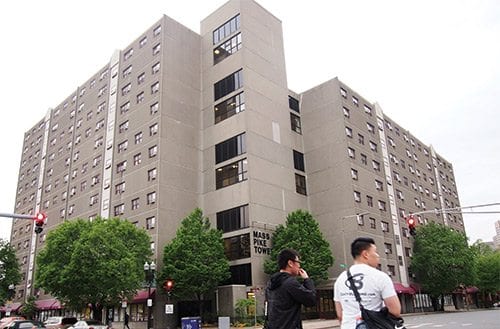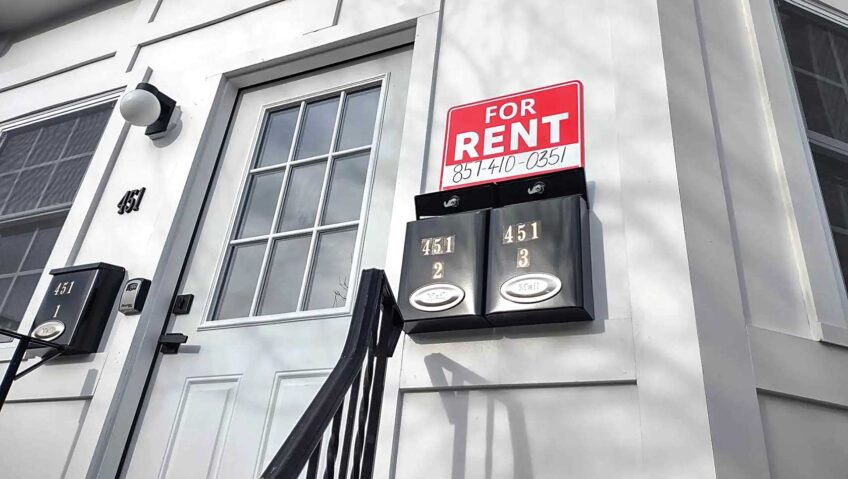Pike tenants seek ownership
Want Chinatown development to be transferred to land trust

A group of Chinatown public housing tenants are locked in a battle over the ownership of the neighborhood’s largest public housing development.
The Mass Pike Towers Tenants Association has asked the City of Boston to exercise an option to buy their 200-unit development from Trinity Financial, the for-profit firm which has owned the complex since 2000.
The tenants say Trinity has shown little interest in selling the development.
“They’re going ahead with their plans,” said Bill Oranczak, president of the tenants’ association. “They’re refinancing and planning major renovations.”
A call to Trinity Principal James Keefe Monday went unreturned.
When Trinity bought the property 16 years ago, the tenants negotiated an option to buy the property from Trinity after 15 years. Under the terms of the agreement, the tenants were to have a six-month time period during which they could exercise their option to purchase the development. In the following six-month time window, the City of Boston was given the opportunity to purchase the property from Trinity. Because the residents missed their window, they are asking the city to purchase the property in cooperation with affordable housing developer Preservation of Affordable Housing (POAH).
Under the tenants’ proposal, land ownership of the Mass Pike Towers would be transferred to the Chinatown Land Trust.
“It would be an additional resource to ensure that if there’s any more development on the land, it would be for the community,” said Lydia Lowe, a board member of the land trust.
The city’s Chief of Housing, Sheila Dillon, said the city is looking at its options.
“We are more interested in this if it’s not going to cost us any affordable housing resources,” she said. “This property is affordable and will remain affordable.”
At the same time, Dillon said, the city is supportive of the tenant’s wishes.
“The administration likes tenant involvement,” she commented. “We like tenant ownership. We’re just doing our due diligence on this.”
Rocky relations
Relations between the Mass Pike tenants and Trinity became rocky in 2004 when the developer proposed building a luxury apartment tower on the development’s parking lot. Oranczak said Chinatown tenants are opposed to the creation of more luxury housing in their neighborhood, as well as the potential loss of parking spaces.
“I’m on the 12th floor,” he said. “Every time I look out my window, there’s a new building going up.”
Mass Pike Towers is hemmed in by the ultra-hip Ink Block complex with its $2,800-a month studio apartments, One Greenway with its $3,600 one-bedroom apartments and The Metropolitan, where a two-bedroom condo is listed for $1.3 million.
Although the Massachusetts Department of Transportation may soon bid out public parcels next to One Greenway, Lowe says it’s unlikely that whatever is built there will be affordable.
“They say that, according to statute, they’re required to go to with the highest bidder,” she commented.
Plans to redevelop the Ho Toy Noodle Factory at 73 Essex Street into a 17-story hotel are the latest in a steady march of luxury development that has changed the makeup of Chinatown. The neighborhood’s Chinese population has fallen from 70 percent in 1990 to 46 percent in 2010, according to the Asian American Legal Defense and Education Fund, which documented the gentrification of Chinatowns in Boston, New York and Philadelphia in a recently released report.
“Boston’s Chinatown has experienced an influx in massive luxury condominiums in the past couple decades, ignoring a 1990 ‘Community Master Plan’ that limited the height of buildings,” the report reads.
“The cumulative effect has been a rise in evictions in privately-owned housing,” Lowe said.
For now, residents in the Mass Pike Towers are pinning their hopes on the city and the good will of Trinity Financial. They’ve asked the firm for a 90-day extension to the six-month time period during which the city has the option to buy the development. Trinity refused.
“Keefe said he doesn’t want to sell it,” said Oranczak, who sat with the developers in a meeting with Dillon and other city officials. “But we’re not backing down from this.”







